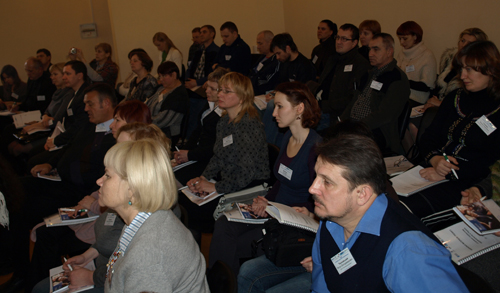24th January 2012
Social entrepreneurship in Ukraine?
On a deeply snowy winter’s morning I visit Pushcha-Vodytsya, on the outskirts of Kiev, to address the participants of a week-long training course on social entrepreneurship.
The idea of most business activity is to earn profits which can be paid to the shareholders who invested in the enterprise in the first place. The difference with social entrepreneurship is that the profits from the initial start-up capital are ploughed back into local communities. Such enterprises go back to 1844 in Britain after the industrial revolution, when the first co-operatives were founded in the mill towns of Lancashire in Northern England.
Today, social enterprise is, literally, big business in the UK, with around 55,000 enterprises employing more than 650,000 people and generating £8.4 billion for the British economy every year. Social enterprises are seen as a way of delivering services to communities, and to those in need across society, which is both cost-effective and inclusive. The purpose of the seminar at Pushcha-Vodytsya is to explore what British experience may be relevant to Ukraine – a society which has been going though major changes over the past 20 years. There is no “one-size-fits all solution”. But the idea of helping people to take the initiative in tackling social issues, rather than waiting for the state or charities to do it, must make sense in every society.
The training is organized by the Renaissance Foundation, working in partnership with the British Council and the East Europe Foundation and supported by PricewaterhouseCoopers, Erste Bank (itself a social enterprise) and the Ukrainian Fund for Support of Enterprise. You can read more about the event here, here, here and here.
If you are interested in finding out more about social entrepreneurship and how it can work for you, please contact: Lyudmila Tatsenko, Project Manager British Council Ukraine, at lyudmila.tatsenko@britishcouncil.org.ua

As a social enterprise we’ve been active in Ukraine since 2002 and in December 2008 were told in an email from the FCO that both they and the Embassy in Ukraine were aware of our activities Earlier in 2008, following a public USAID solicitation to apply for funding, we were informed by USAID in Ukraine that they had no budget to support our efforts in aid of “retarded” children.
We applied to partner with the British Council introducing our work and were disregarded. A letter to my MP would reveal the eligibility criteria included the need to make a financial contribution. The British Council still advertise for partners with no such criteria declared.
This is surely a corporate showcase, One which has failed spectacularly when one considers the current social unrest in Ukraine.